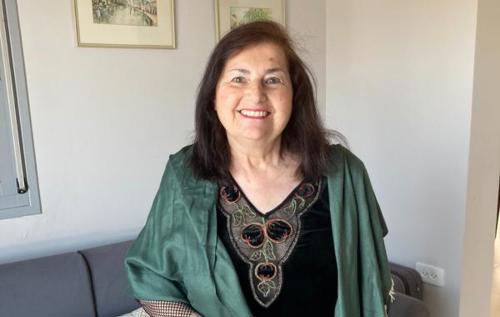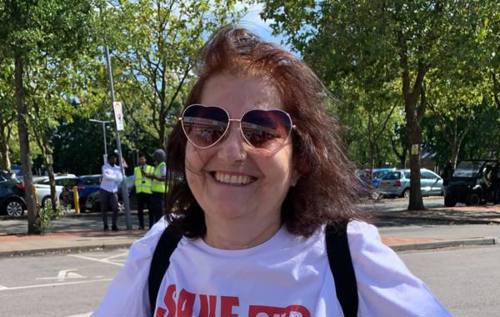“Allow yourself to have fun.” Joy shares how taking care of herself helps her to live well with arthritis
01 October 2023
71-year-old Joy is a huge advocate for taking control of her health. She lives with rheumatoid arthritis, osteoarthritis and polymyalgia rheumatica, and has found lots of great ways to cope with her symptoms.
Joy tells us what it’s like to live with her conditions and shares how music, creativity and changes to her daily routine can help her to manage pain.
Living with rheumatoid arthritis and osteoarthritis
 At the age of 58, Joy realised she hadn’t been walking normally. After going to her GP and being referred to a rheumatologist, she was diagnosed with osteoarthritis and rheumatoid arthritis.
At the age of 58, Joy realised she hadn’t been walking normally. After going to her GP and being referred to a rheumatologist, she was diagnosed with osteoarthritis and rheumatoid arthritis.
Osteoarthritis is the most common type of arthritis, and it will affect half of us by age 70 years.
Our joints are made of complex living tissue that our bodies constantly repair and maintain. And osteoarthritis occurs when our bodies can no longer do this effectively.
The cartilage becomes thin, and the joint cannot move as easily as before. The body’s attempt to repair the joint results in pain, stiffness and sometimes swelling.
Differently, rheumatoid arthritis is what is known as an auto-immune condition. This means that the immune system, which is the body’s natural self-defence system, gets confused and starts to attack the body’s healthy tissues.
In rheumatoid arthritis, this attack targets the joints, causing pain, stiffness and swelling. Urgent, intensive specialist treatment is required to rebalance the immune system to prevent long-term joint damage, pain and disability.
Joy was surprised to get a diagnosis of rheumatoid arthritis alongside osteoarthritis. “My mother had osteoarthritis, so the word arthritis didn’t particularly bother me,” she says. “But as soon as I realised it was rheumatoid arthritis, I knew it would require regular medical intervention and some pills, which was a disappointment.
“I’ve had flare ups here and there ever since, and lots of blood tests and check-ups.”
Living with polymyalgia rheumatica
 Joy had knee replacement surgery last year. It’s unlikely it was connected to having surgery, but soon after she started experiencing severe pain in her body. She was diagnosed as having developed polymyalgia rheumatica.
Joy had knee replacement surgery last year. It’s unlikely it was connected to having surgery, but soon after she started experiencing severe pain in her body. She was diagnosed as having developed polymyalgia rheumatica.
Polymyalgia rheumatica is a relatively common auto-immune disease where the immune system attacks the tissues in and around the joints, in particular the shoulders and hips.
People with polymyalgia rheumatica experience stiffness, pain and high levels of fatigue, and they may find it difficult to carry out everyday tasks such as getting dressed or climbing stairs.
Joy hadn’t been expecting to be diagnosed with polymyalgia rheumatica.
“I thought it was my rheumatoid arthritis flaring up,” she says. “I never thought I’d have something else. I was prepared for the knee replacement pain, but I couldn’t work out how to deal with the pain in my entire body. I didn’t sleep for a month.”
After being diagnosed, Joy started taking steroid tablets. Polymyalgia rheumatica symptoms generally settle within a week or two of steroid treatment, and then people make a plan with their doctor to gradually reduce the dose over the coming weeks and months. Most people find that the condition goes away completely within one to three years, and they can stop steroids completely.
“I started off on a high dose and now it’s lower and I expect it will be lowered again," says Joy. “They say the steroids reduce the pain by 70 percent and I’d say that’s true. It’s manageable.”
Self-care and pain management
Joy enjoys being creative, and she has found things that help her to manage her condition. Here are some of the things Joy has found to help with her pain and enable her live well with her two types of arthritis and polymyalgia.
Music
"When the pandemic hit, I decided I wanted to try writing music," says Joy. "Some of my songs have been produced and distributed under the name Joy Helena Solomon. I’m not a singer or a ‘personality’, but when you’re at this time in your life it really doesn’t matter. I’m doing it for fun.
“Music really helps when I’m feeling miserable. I enjoy it as a tool to get me through things. Even if you’re very stiff, put on some music and you’ll find your hips and shoulders wiggle a little bit. If you let the music lift you, your body will respond.”
Self-care and exercise
Joy believes in doing things for herself. “It could be swimming, walking, taking supplements or being sensible about what you eat,” she says. “I'm a member of a leisure centre next to a local hospital. The swimming pool is accessible to those with mobility issues and other disabilities, which suits me very well.
“Take care in simple ways, go downstairs a little gingerly, be very present in your movements," she advises. “Don’t neglect yourself and indulge in self-care, whatever that means for you.”
The right routine
Finding a routine that works for you can be very helpful when you deal with daily arthritis pain. It can also have a significant impact on your mental health.
“It’s very easy to get depressed when you wake up in pain every morning,” says Joy, “so I don’t push myself too hard. I’ll go out in the garden with a cup of tea and listen to the birds, a bit of music.
“I know that from the middle of the morning till the evening I’m at my best, so I achieve the most demanding tasks at that time. I don’t eat heavy meals too late because that also doesn’t suit me.”
Pain relief
Joy has also found it helpful to do simple things that help her symptoms.
“If a joint is really hurting, I’ll use ice cubes in a towel or a hot water bottle; things that are a bit comforting," she says. “I don’t want to make life complicated.”
Fun hobbies
Joy is a trained teacher and has worked in colleges for many years. Now that things are winding down, she’s enjoying having more time for hobbies, such as reading. “Since my father took me to the library as a young child, I have read many books a week,” she says. “You can really lose yourself and forget things when reading.
“Recently, I was able to join in person with other songwriters for a couple of days to try to write songs suitable for Eurovision. That was a lot of fun. Allow yourself to have fun.”
Gratitude and self-forgiveness
“Forgive yourself," says Joy. “If you feel tired, allow yourself to lie down. Sit down and put your feet up. Listen to your body.
“When I was diagnosed with rheumatoid arthritis, I knew it would require regular medical intervention, and that was a disappointment. But I know I was lucky to have got to age 58 without any joint problems before that.
“I’m immensely grateful for those who have helped me over the years, particularly my doctors, husband and family.”
We’re here whenever you need us
- If you need advice or support, you can call our free helpline on 0800 5200 520
- Chat to our Arthritis Virtual Assistant
- Join our online community
- Stay in touch and follow us on X (Twitter), Facebook and Instagram.